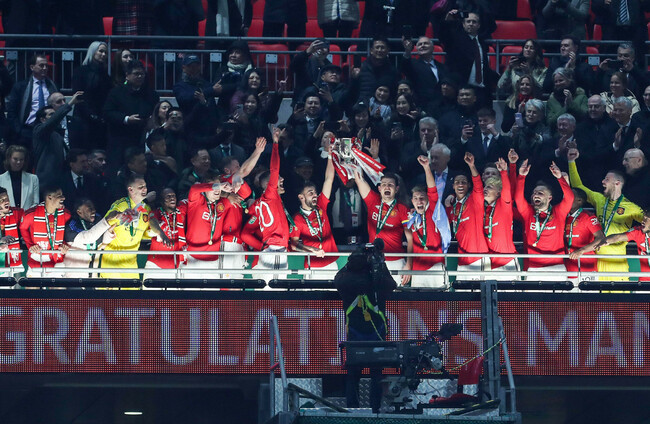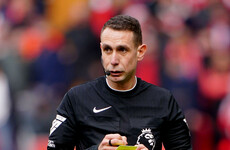LAST UPDATE | 5 Mar 2023
THE LAST time Manchester United faced Liverpool in the Premier League, the two teams’ roles were effectively reversed.
The Anfield outfit were seen as the quintessential example of a thriving, well-run club whose manager, players, and hierarchy could essentially do no wrong.
The Red Devils, by contrast, were widely regarded as not fit for purpose and a shambles.
Ahead of the 22 August 2022 encounter, Ralf Rangnick’s previous suggestion that it could take 18 months to fix the squad’s many issues was looking like a generous assessment.
United had lost their opening two games — 2-1 to Brighton and infamously, 4-0 at Brentford.
Liverpool had drawn their opening two matches against Fulham and Crystal Palace, though it was assumed to be a mere hiccup for a side that had gone very close to claiming a remarkable quadruple the previous season.
Yet against the odds, Ten Hag’s side prevailed 2-1, despite seemingly being in disarray. Usually, wins are viewed as no more than a welcome three points, but occasionally, they can seem like the catalyst for a minor footballing revolution.
Increasingly, the Dutchman’s first victory as a Premier League manager feels like a watershed moment both in terms of his own career and for United as a whole.
That day, he made two especially brave, authoritative decisions — the type that have ultimately characterised his time at United.
He dropped captain Harry Maguire and star striker Cristiano Ronaldo.
Six months on and Ronaldo has been sold, while it looks as if Maguire may soon follow given his limited game time since. In contrast the no-longer-influential duo, United appear to be in rude health.
Those two big calls set a benchmark and established Ten Hag’s reputation as a kind of anti-Ole Gunnar Solskjaer.
The Norwegian was generally well-liked by players at the club but perceived by some critics as too soft.
There were reports of disharmony in the dressing room amid the perception that certain players who were underperforming, such as Maguire, were virtually undroppable.
Solskjaer invariably showed great loyalty to star players like Ronaldo, but it did not pay off given the increasingly dismal results that eventually cost him his job.
The brief, somewhat bizarre interim reign of Ralf Rangnick only exacerbated the situation, as United slumped to an uninspired sixth-place finish. Perhaps on this occasion, they might have been better off sticking with the original legendary-ex-player-cum-caretaker as they did with Solskjaer, given the minor miracles Michael Carrick has subsequently been working at Middlesbrough,
However, with improbable speed, Ten Hag has managed to turn the situation around.
Some of his initiatives felt like common sense — he has judged players on form rather than reputation, and while he handled the Ronaldo situation well, you could argue it was more the Portuguese superstar who had made his position at the club untenable by regularly demonstrating his disaffection in public forums.
You could also argue that the recruitment of one of United’s best and most important players this season, Casemiro, was more by accident than design. It’s no secret that the deal only came about at the last minute owing to the club’s repeated failures to land long-term target Frenkie de Jong.
Yet if it were really so easy, then surely all of David Moyes, Louis Van Gaal, Jose Mourinho, Solskjaer and Rangnick would not have either spectacularly or effectively failed in the hotseat.
Granted, there were second-place finishes and trophies won, but none of these managers can truly claim to be successes, on the basis that they each lasted fewer than three years nor did any of them add to the club’s record-breaking league title haul.
And while Ten Hag can be tactically astute and is a football purist to a great degree, there is a case to be made that, like Alex Ferguson, the heart of his success is in people management.
He is not quite as stern and ideological as Mourinho or Van Gaal, nor is he as friendly, amenable, and open to different ideas (such as suddenly accommodating an aging Cristiano Ronaldo into a side whose style is based primarily on a lightning-quick counter-attack) as Solskjaer.
In this era of heatmaps and expected goals, it seems unfashionable to point out the more basic, unsophisticated explanation for the Dutch coach’s unexpectedly swift success — he is simply very good at getting the best out of a substantial collection of hugely diverse, highly sensitive, and deeply egotistical millionaires. As Graham Potter has been discovering at Chelsea, it is easier said than done.
How else is it possible to explain Marcus Rashford’s prompt return to form from five goals in 32 appearances last season to 28 in 44 this term?
Consequently, there are uncanny similarities to Liverpool near the start of Jurgen Klopp’s reign.
The German’s similarly bold and uncompromising vision, which has surprisingly grown stale of late amid a coterie of exhausted-looking players with an unenviable collective age profile, meant in the early days, certain star players were ruthlessly cast aside in Ronaldo-esque fashion — a trick Klopp has seemingly failed to repeat with the same level of success, partially owing to the increasingly inept recruitment of the Anfield club as a whole.
For instance, back then, big-money £32.5 million signing Christian Benteke joined the Reds shortly before Klopp did, but left the following year when it swiftly became apparent he would not be part of the manager’s long-term plans, nor did he in any way suit the innovative new gegenpressing-dependent system the German was intent on strictly deploying.
Like Ten Hag, from the outset with Klopp, there were promising signs. The disappointment of an eighth-place finish in that first season was tempered somewhat by final appearances in both the 2015-16 League Cup and Europa League, although, unlike United, they failed to claim any silverware initially. It seems like an entirely different world when you consider that Daniel Sturridge finished the season as their top scorer in all competitions with 13 goals, taking the mantle from Steven Gerrard the previous year.
But even before they finally won the Premier League in 2020, the sense of progress felt consistent, as Liverpool made back-to-back Champions League final appearances, winning on the latter occasion.
There is a similar feel of intense momentum now at Old Trafford. Like Liverpool in the early days of Klopp, they are certainly not the finished product or at the level of Manchester City at their dominant best.
Yet they are surely not so far off as some skeptics may suspect. In a manner akin to Liverpool’s game-changing acquisitions of Virgil van Dijk and Alisson, you feel two or three more big signings can have a transformative effect and take United as close as they’ve ever been to pursuing sustained glory in the post-Alex Ferguson era.
Then again, the trajectories of teams in football can change rapidly and a Liverpool win this afternoon may dramatically galvanise the Reds in the same way it did their rivals back in August. So once again, it feels as if more than three points are at stake for both sides.













20 leinster
8 ulster
5 munster
4 connacht
The lads must not get petrol money to travel outside dublin to go watch the other 3 provinces,just goes to show where the development of the game going.
@Teadore Hungwell: or Leinster are at a much higher level on developing youth talent.
@Teadore Hungwell: @Teadore Hungwell: you think the best U20’s haven’t been picked ? Is 20/37 that odd given the rugby population of the Leinster province (and the actual population of 2.6m)
@BMJF: agreed, can not be good for the overall game of rugby provincially though ,bit like where Dublin are now last few years with GAA
@BMJF: Ulster’s population is comparable to Leinsters, Munster has half the population of Leinster. Proportionate to population Munster are maybe 1 or 2 light and Connacht are doing better than would be expected. But Ulster should have more.
@Darren Byrne: but only recently are you getting catholics playing rugby in ulster, so while the population is not far behind, the rugby playing pop is (but that seems to be changing)
@Teadore Hungwell: I don’t understand this mentality. Leinster have an exceptional system, from the age of 8 a sizable portion of the population are playing rugby at a club or in their school. Leinster have invested heavily in schools, developing coaching, refereeing, providing technical expertise, investing in facilities, not least the superb facility at Donnybrook, there’s also the schools cup, one of the oldest rugby competitions in the world, the culture of the cup is to a schools player / supporter what European cup is at provincial level, the standard is better than anywhere in the world outside New Zealand. Then you have an academy system that is modeled on that of Man City including incorporating sports science. Leinster is an anomaly that elevates Irish rugby. Hardly a bad thing.
@Teadore Hungwell: Seems to be a good few non Dublin Leinster players. Also, the coaches are mostly Connacht with Colm Tucker being Limerick. Stranger than the huge Leinster contingent is the zero Limerick players. Either a sign of limited population choosing hurling or poor development of youth in rugby.
Sean,
Any chance the42 would break it down by position?
Thomas Ahearn is Dungarvan not waterpark. Played with dungarvan up until under 18s.
@Ormond: nice to see 2 Waterford lads in the squad. Good for Munster in the long term if the county is involved. Well done to all their former clubs & coaches
@kieran horgan: Been a promising development-growth for Munster in what some might call non-traditional rugby counties such as Waterford and Tipperary recently which is good to see.
Keep an eye out for Andrew Smith, plays 15 or wing, has scored some spectacular tries throughout age grade. Here’s a sample of his finishing:
https://twitter.com/leinsterrugby/status/1170756649855979520?s=21
Soroka is Belvedere not Blackrock
Does anyone why John McKee went from Campbell to Leinster – just curious..
@nolamentor: Ulster viewed him as a prop but he wanted to play hooker. So he moved to Leinster.
@TREVOR JOHNSTON: I think Stewart is the better prospect anyway
@TREVOR JOHNSTON: That is very telling of where Ulster academy are in terms of developing players.
@nolamentor: Tom Stewart was coming through behind McKee. Stewart is heir apparent. Very grounded fella, should go far with his ability.
Actually 4 lads from the Exiles programme in the squad Josh Dunne (Connacht), Oran McNulty (Connacht), Hayden Hyde (Ulster) & Dan Kelly(Loughborough)
My hot photos are here…
http://69-chat.club
only 18+